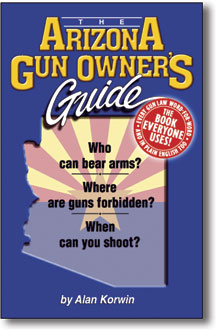
| Home | Books | National Directory | Position Papers | Alan’s Blog | FAQ | New Stuff | Search |
|
Arizona Gun-Law Updates 2009All the gun laws in plain English These are changes to The Arizona Gun Owner's Guide, (2007, ed. 23) Get the changes for 2007, 2008 and 2009 as a printable insert for your book.
=== The Arizona Gun Owner's Guide July 16, 2009 Permission to circulate granted Use our home page to get on our list: EIGHT GUN BILLS SIGNED BY AZ GOVERNOR
|
 on gun laws and other topics.
|


